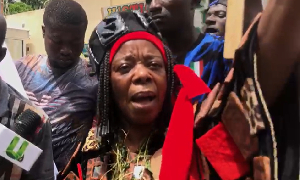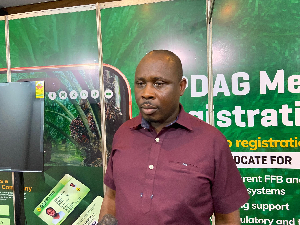Intelligence, they say is what the tests test and beauty, they claim is the eye of the beholder. However, the intelligence and the striking beauty of Charlotte Osei, the chairperson of Ghana’s electoral commission (EC) cannot be gainsaid. Appearing before parliament where she was grilled by law makers on journalists’ accreditation funds in the lead-up to 2016 legislative and presidential elections, the ever confident and professional Charlotte Osei seemed to recognize a heightened level of emotional disquietude.
Charlotte is the newest casualty of Ghana’s age-long systemic attrition and public employees’ placebo. Ghana needs a conscious effort to curb the influence of the public institution syndicates and their proclivity to coerce their leaders and would-be leaders to maintain the status quo relative to performance. How long must they continue to compel governments to sacrifice competent leaders on unholy altars of their own selfish and ego-centric convenience?
Charlotte Osei is not the problem, the problem comes from some employees who behaved as if they have a registered oath in heaven to destroy the commission. What is the Ghanaian public employee systemic placebo?
In medicine and psychotherapy, a placebo is a producer or a substance that is practically devoid of a specific activity for the condition under treatment. A therapeutic effect that comes out of placebo is known as the placebo effect. In other words, a placebo is any therapeutic procedure or a component of any therapeutic procedure which is given intentionally to have an effect or unknowingly and has an effect on a symptom, syndrome, disease or client but which is objectively without a specific activity for the condition being treated (Moeman, 2002).
The changes produce by placebos are known as placebo effects. In plain language, a placebo is any procedure typically designed to please or calm someone. At this context employees’ placebo refers to the propensity of workers to portray their leaders as evil while they pretend to be anti-corruption saints in the eyes of the public.
To put into perspective, they blackmail their leaders and create favorable impressions for themselves. So the workers placebo is to please Ghanaians and the government that they are law abiding and loathe bribery and corruption but their leaders behave otherwise.
The late Chief Sammy Tinkrong was one of my terrific modern European history lecturers during my days at University of Cape Coast. In one of my writings, I equally mentioned Nana Kobina Nketsia IV, paramount chief of Essikado Traditional area in the Western Region of the Republic of Ghana as a man of impressive historical and philosophical erudition. Nana and Tinkrong had a profound influence on me. Mr. Tinkrong did not only introduce me to François-Marie Arouet commonly known as Voltaire but also told myself and course mates an anecdote by Voltaire.
Voltaire was a great critic of the church and is credited for the following quote: “Those who can make you believe absurdities can make you commit atrocities.” Voltaire said a bishop was resting in a garden and he was bitten by a snake. After that the snake went and died and the bishop survived, to wit that the bishop was more poisonous than the snake. Are some Ghanaian public employees including that of EC not more poisonous than leaders they accused?
The workers of Ghanaian public institutions always accuse their leaders of corruption while in effect they produce a placebo to every new administration. Their placebos are characterized with bootlicking, sycophancy and ingratiation which they skillfully play against members of the two main political parties; National Democratic Congress (NDC) and New Patriotic Party (NPP).
Let me share my encounter with Volta River Authority (VRA) employee at Akuse Clubhouse in 2006. I visited Kpong hydroelectric power dam and had a chance to engage one VRA worker in a conversation. I wanted to gather facts about Dr. Charles Wereko Brobbey’s alleged scandal. This worker told me that the policies Dr. Brobbey introduced were practically good for Ghana. And that the former VRA boss was opposed because some top officials felt all their sources of extorting and looting money from their customers and the state would be threatened with him in office. After Dr. Brobbey’s exit what happened to electric power supply in Ghana? The answer is a protracted erratic power supply. The Chief Executive Officer (CEO) of Bulk Oil Storage and Transportation (BOST), Mr. Alfred Obeng Boateng nearly became a victim of employees’ systemic attrition.
Charlotte Osei may not be perfect but her deputies have no rights to disrespect her. Ghana’s 1992 constitution grant powers to any president to appoint heads of public institutions like Electoral Commission (EC), Lands Commission, Commission on Human Rights and Administrative Justice (CHRAJ) or Chief Justice (CJ).
Every leader comes with his/her own unique style and no EC employee must disrespect Charlotte Osei. If a worker does not like her as EC Boss, then working at the commission is free entry free exit! He/she must resign honorably. I strongly disagree with media practitioners positing that the EC brouhaha must be decoupled from partisan politics. It is highly impossible to deconstruct EC conflict from partisan politics.
The EC chairperson was appointed by former President John Dramani Mahama (JDM) in consultation with the rubber stump council of state and in accordance with constitutional requirement. As Chenua Achebe observed in his “A Man of The People” no one will spit out a juicy morsel that good fortune placed in his mouth.
Every political party, given the opportunity to appoint EC Boss, CJ, Inspector General of Police (IGP) or CHRAJ boss will certainly appoint their undercover sympathizers. Needless to say, had JDM and NDC retained power, Justice Williams Atuguba would have been our CJ now. Prior to the appointment of Justice Sophia Akuffo as CJ, why did three names pop up? I have no intention to inundate you with a platitude, even so, Mario Cumuo statement that politicians campaign in poetry and govern in prose is palpably appropriate for the EC dispute and the conduct of politicians from both sides.
I will succinctly posit that either NDC or NPP will sidle up to the trough of political convenience if they have opportunities to appoint state institutions CEOs. I admire the way Charlotte Osei took a bold step to sanitize the presidential ballot paper in the run up to 2016 elections. Wait until about 3000 presidential aspirants all qualify to contest for an election and you will not only understand me but help to imagine the size of the ballot paper.
We are treading on a dangerous path with the so-called faceless petition. Why are petitioners hiding under darkness if they truly believe they have a good case?
The good book says: “The light shines in the darkness, and the darkness has not overcome it” (John 1:5). Almost all the allegations against EC boss occurred in 2016 and why now? Would the faceless petitioners come out with the allegations if JDM had retained power? So you see! My good friend Koo Nimo, the doubting Thomas, the EC scandal is inseparable from partisan politics!
Certainly if a genuine prima facie case is established against Charlotte Osei, then she is not above the law. I personally think alternative dispute resolution (ADR) is an appropriate intervention for the EC conflict. We must also look at the impeachment process of a sensitive position like EC boss. The president receiving a petition and forwarding it to the CJ to set up a panel to investigate and ascertain if there is a prima facie case somewhat bear a semblance of dictatorship. Like India and USA, impeachment must be the core mandate of parliament.
EC workers calling for impeachment of Charlotte Osei could be unthinkable saboteurs bereft of dignity to cleanse the commission and probably looking for avenues to perpetrate their veritable greed against the state.
Dear Charlotte Osei, you will have to agree with Confucius that “Silence is a true friend who never betrays.” Lengthy responses in the media are needless.
God Bless Our Homeland Ghana!
Opinions of Monday, 31 July 2017
Columnist: Nana Yaw Osei















